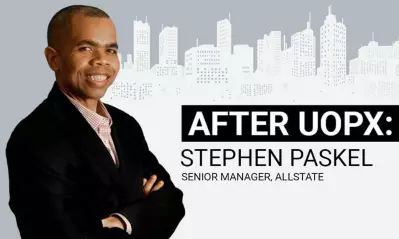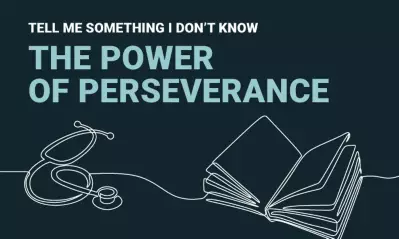The thinker: Why alumna Juana Lang risked it all

Written by Elizabeth Exline

Speak with Juana Lang, EdD, about books, research or her harrowing escape from Cuba, and you’ll immediately notice she is not one to rush or multitask. She gives her full attention to the topic at hand. She chooses her words carefully, although that’s not because of a language barrier. (After so many years in the U.S., she now speaks English more fluently in some ways than her native Spanish.) Instead, Lang is a woman who gives careful consideration to just about everything.
“I have always been a thinker,” she explains. “When I write a piece or when I research something, I keep thinking, ‘How can I do this better?’”
Then, the reason for this discipline emerges.
“I was only allowed to see through a tunnel [when living in Cuba], so when I was able to expand my vision, I live this life in constant amazement,” she says.

Growing up in a communist country where not only certain words but even certain thoughts were discouraged has shaped Lang into a voracious reader, thinker and researcher. It informs her work as a research fellow with University of Phoenix’s Center for Leadership Studies and Organizational Research as well as her research for the Center for Educational and Instructional Technology Research. It inspires her as a K–12 educator. It defines who she is as a person.
Fleeing communism
None of Lang’s achievements were handed to her. Not her education, not her research, not even her U.S. citizenship.
Lang was part of the 1994 Cuban raft crisis known as the balseros , or rafters. The official narrative goes something like this: Then-leader Fidel Castro capitulated to riots and the repeated theft of government boats and temporarily allowed the exit of Cubans who wanted to leave.
This hadn’t been the case previously: In fact, it was illegal until 2013 for Cubans to leave or help others trying to leave their country.
Lang’s own story carries some of these undertones. “I didn’t have a lot of information,” she says, “so I had a lot of questions.”
As a child, she thought the icon of Christ she found in her mother’s closet was a picture of a relative. (“I always say I’m going to write a story about ‘The Man Behind the Clothes in the Closet,’” Lang jokes.) In college, she wondered why they only studied Lenin and Marx and never Socrates or Plato.
“I was so angry in my teens and early 20s,” Lang recalls. “I thought, ‘Why can’t I do that? What can’t I say this? Why can’t I go here? Why can’t I travel? Why do I work and earn $4 a month?’”
Lang channeled that fury into her studies. She became a teacher, something she’d always wanted to be, and she got married. But things were growing increasingly dangerous for Lang, who was vocal about her curiosity and her insatiable desire to learn.
“I said, ‘There is something else out there. It’s not possible that I can only read this book and I can only swear allegiance to this [political] party or organization,’” Lang recalls.
Lang, for the record, refused to join those organizations, a fact that made it increasingly difficult for her to attend conferences, travel or work. “I was viewed as somebody who was not loyal to the system,” Lang reflects. “That’s one of the reasons why my mother wanted me to leave.”
Danger at sea
Lang and her husband at that time decided to go. Lang didn’t realize she would become part of an exodus that would include upward of 32,000 Cubans. “I didn’t know so many people were leaving when I left,” she says. “I thought it was just me and a few other neighbors.”
Lang’s vessel for escape was a raft fashioned out of tractor-tire inner tubes and plastic foam. They had an old compass to guide them, but no engine to power their journey, no actual boat to protect them. And Lang was 6 weeks pregnant at the time.
Lang’s father bemoaned her certain death at sea. Lang’s mother said she’d rather her daughter die on the ocean than in a Cuban jail.
None of this deterred her.
Lang, her then-husband and five others launched in the direction of Florida and spent the first day paddling. The second day, a storm came.
“You would see a wall of water coming toward you,” Lang recalls. “I’d close my eyes, and I hung on to the other man on the raft as we went up, like a roller coaster. All of a sudden, we went down, and it just went on for hours and hours and hours and hours.”
They could hear screams but didn’t know where they were coming from. Lang developed sores on her back from the seawater. Finally, morning dawned, and the storm subsided. On the third night, the U.S. Coast Guard rescued Lang and her companions and sent them to Guantánamo Bay as part of Operation Sea Signal .
"When I discovered research, it changed my life."
Juana Lang
Doctor of Education | 2022
Finding intellectual freedom
It was there that Lang began her new life, although she didn’t necessarily realize it. She worked as a translator for the base dentist and ultimately named her son, whom she delivered on the base, after him. (Her son received his first name, Kevin, for actor Kevin Costner. His second name, Kurt, was for the dentist.)
Lang began to discover everything that her instinct had hinted at but that her reality had kept closed off from her. She learned about Thanksgiving and Christmas. When she eventually arrived in Arizona in 1995, she took pictures at the grocery store and wept for the abundance. She learned how to drive, how to hold a bank account.
Perhaps more than anything, however, she learned what she’d been missing intellectually in Cuba.
“I didn’t know how I was going to do it, but I had to go to school [to become a teacher in the U.S.],” Lang says. “Everything seemed impossible at first, but with time, I was able to manage.”
Lang found University of Phoenix , where she not only prepared to earn her teaching certificate, but where she later earned her master’s degree
and her Doctor of Education
as well.
“When I discovered research,” Lang says, “it changed my life.”
The doctorate proved to be the pathway Lang needed to contribute to her field and the world at large. “I find a lot of problems that have not been solved,” Lang says. “I cannot go from this world without making my contribution.”

According to Dr. Lucinda Hines, a Center for Leadership Studies and Organizational Research fellow, that contribution is relatively profound. Hines and Lang met in 2021 as doctoral students in the same cohort, writing together and sharing ideas.
“She does extensive research, which is evident in the deep insights of her work,” Hines says of Lang. “She meticulously examines every detail, explores complex concepts and produces thought-provoking, well-reasoned results and outcomes.”
Case in point is Lang’s article on school violence in which she draws on a range of research to highlight the interconnectedness of the issue’s multiple causes. Or the piece she wrote on how to make teacher feedback a productive experience
.
A considered reflection
Today, Lang can look back on her journey with some equanimity. Her children are grown; her daughter is pursuing a doctoral degree herself. (Lang marvels at how American her children are, taking things for granted that Lang still appreciates.)
She loves Tolstoy, Plato and Socrates. “I have read so much [since coming to the U.S.],” she quips, “and definitely not a single book about Marx and Lenin.”
Now in Florida, Lang continues to work as a teacher and conduct research for UOPX. Most importantly, she continues to study, reflect and think.
“Dr. Lang is a well-rounded, positive individual who is very supportive and an excellent communicator,” Hines adds. “These qualities, as well as many others, make her an invaluable friend and colleague.”
They also made her uniquely positioned to thrive in her new country.
“What I have done with my life, I don’t think I would ever have done it if I had stayed in Cuba,” Lang says. “[Some] people say, ‘I love my motherland,’ [but] I love the people I left behind. This is my motherland and my fatherland. It gave me everything I could accomplish. The only thing I regret is I wish I had been born here.”
As for that angry teenager she used to be? Well, she’s gone. As Lang says, “She became a researcher.”

ABOUT THE AUTHOR
Elizabeth Exline has been telling stories ever since she won a writing contest in third grade. She's covered design and architecture, travel, lifestyle content and a host of other topics for national, regional, local and brand publications. Additionally, she's worked in content development for Marriott International and manuscript development for a variety of authors.
This article has been vetted by University of Phoenix's editorial advisory committee.
Read more about our editorial process.
Read more articles like this:


